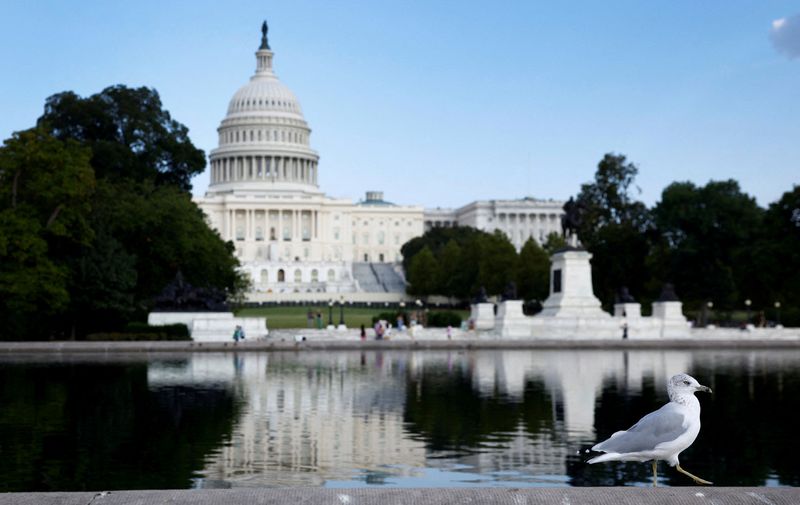By Richard Cowan
WASHINGTON (Reuters) – The U.S. House of Representatives on Wednesday was poised to avert a partial government shutdown next week, even as a large number of Republicans were prepared to revolt against their leadership for failing to achieve new federal spending cuts.
The stopgap funding bill will maintain the government’s current level of roughly $1.2 trillion in annual discretionary funding through Dec. 20, avoiding the furloughing of thousands of federal workers and shutdown of a wide swath of government services just weeks before the Nov. 5 election.
House Speaker Mike Johnson plans to use a parliamentary maneuver to pass legislation, bypassing the House Rules Committee to overcome opposition within his own Republican Party, which holds a 220-212 majority.
If he succeeds, which is expected, the Democratic-majority Senate is also set to vote on the bill on Wednesday and send it on to be signed into law by President Joe Biden before current funding expires at midnight Monday.
A significant number of House Republicans are expected to defy their leader and vote against the measure, after Republican presidential candidate Donald Trump earlier spoke in favor of a shutdown unless controversial legislation was attached to the spending bill that outlawed non-citizens voting in federal elections, something that already is illegal.
“We’ll work in a bipartisan way to make sure that this gets done,” No. 3 House Democrat Pete Aguilar told reporters on Tuesday.
Some Republicans expressed frustration in the run-up to Wednesday’s vote on the spending bill known as a “continuing resolution” or “CR.”
“He (Johnson) committed to the conference that we weren’t going to govern by CRs anymore … here we are. So, I’m sure there’s a bunch of members that are frustrated,” said Republican Representative Greg Steube.
Hard-right House Republicans had been pushing for a six-month CR with the election piece attached, but last week failed to pass that bill, which would have been lost in the Senate anyway.
Nonetheless, some of the most conservative Republicans thought Johnson and all rank-and-file Republicans should have fought harder against a Democratic victory, even if it meant a shutdown.
Johnson has repeatedly had to bypass his own restive caucus to pass critical legislation. In March, the House passed the current funding bill despite 112 Republican “no” votes.
April brought the passage of nearly $61 billion in new aid for Ukraine, which has battled a Russian invasion since February, 2022. Again, 112 Republicans voted against Johnson’s effort.
The infighting comes after Johnson’s predecessor, then-Speaker Kevin McCarthy, was ousted by right-wing Republicans in an historic vote, as they punished him for reaching a bipartisan spending and debt limit deal with Biden.
That latter fight will recur late this year. Democrats and Republicans will have to negotiate over full-year government funding. And it faces an even more critical self-imposed Jan. 1 deadline to either to raise the nation’s debt ceiling or risk defaulting on more than $35 trillion in federal government debt.

